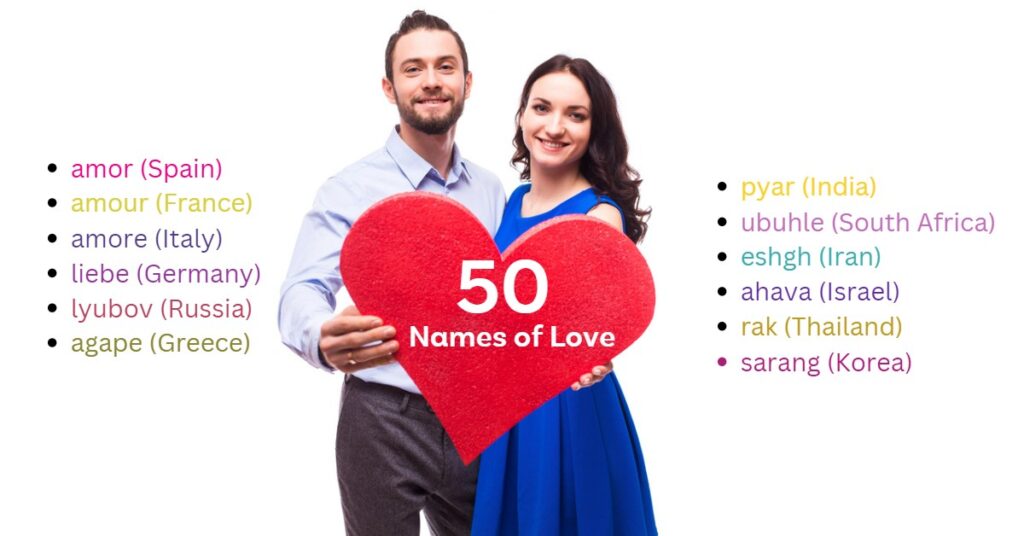Are you a passionate lover looking to add a special touch to your romantic relationship? Do you want to surprise your lover by addressing them with different names and translations for love from around the world? Then you have come to the right place. By using these 50 names of love from 50 different countries, you will be able to describe your love in a unique and meaningful way. Not only will it showcase your knowledge and interest in different languages and cultures, but it will also give your loved one a deeper understanding and appreciation of the universal language of love. From the romantic languages of Europe to the exotic cultures of Africa, Asia, and the Middle East, you can express your love in a way that will make your loved one feel truly special and valued. Make your relationship global and surprise your lover with the special touch of different names of love.
Love is a universal emotion that connects us all, but did you know that it is called different things in different countries and cultures? From amour in French to zakochanie in Polish, the way we express and define love can vary greatly. In this article, we will explore 50 different names for love from around the world. Not only will you learn the translations, but also the cultural significance and context behind each term. Whether you’re a language learner, a traveler, or simply curious about the many ways love is expressed, this article is for you.
Dive into the romantic languages of Italy, Spain and France and learn how amore, amor and amour respectively convey the depth of love. Explore the exotic cultures of Africa, Asia and Middle East, where love is described with words like Moyo in Swahili, Pyar in Hindi and Houbb in Arabic. Discover the unique words for love in different languages of Europe like Szerelem in Hungarian, Kärlek in Swedish and Liubov in Russian.
This article will give you a deeper understanding and appreciation of the cultural diversity of the world and how love is a universal language that brings us together. By reading this article, you will not only expand your vocabulary but also gain a new perspective on the many ways love is celebrated and expressed. So, join us as we take a journey through 50 different names for love and discover the beauty of the global language of love.
- In Spanish, love is called amor (Spain)
- In French, it is amour (France)
- In Italian, it is amore (Italy)
- In German, it is liebe (Germany)
- In Portuguese, it is amor (Portugal, Brazil)
- In Arabic, it is hob (Arabic-speaking countries)
- In Chinese, it is ai (China, Taiwan)
- In Japanese, it is ai (Japan)
- In Russian, it is lyubov (Russia)
- In Greek, it is agape (Greece)
- In Hindi, it is pyar (India)
- In Swahili, it is upendo (Kenya, Tanzania, Uganda)
- In Zulu, it is ubuhle (South Africa)
- In Persian, it is eshgh (Iran)
- In Hebrew, it is ahava (Israel)
- In Thai, it is rak (Thailand)
- In Korean, it is sarang (Korea)
- In Swedish, it is kärlek (Sweden)
- In Danish, it is kærlighed (Denmark)
- In Finnish, it is rakkaus (Finland)
- In Turkish, it is ask (Turkey)
- In Indonesian, it is cinta (Indonesia)
- In Malay, it is cinta (Malaysia, Brunei, Singapore)
- In Tagalog, it is pagmamahal (Philippines)
- In Vietnamese, it is yêu (Vietnam)
- In Icelandic, it is ást (Iceland)
- In Polish, it is milosc (Poland)
- In Czech, it is láska (Czech Republic)
- In Hungarian, it is szerelem (Hungary)
- In Croatian, it is ljubav (Croatia)
- In Slovak, it is láska (Slovakia)
- In Slovenian, it is ljubezen (Slovenia)
- Dutch, it is liefde (Netherlands)
- Norwegian, it is kjærlighet (Norway)
- Zulu: uphondo (South Africa)
- Xhosa: ubuso (South Africa)
- Yoruba: ewe (Nigeria)
- Igbo: nwunye (Nigeria)
- Hausa: soyayya (Nigeria, Niger)
- Oromo: kadha (Ethiopia)
- Somali: jacayl (Somalia)
- Afrikaans: liefde (South Africa)
- Lithuanian: meilė (Lithuania)
- Latvian: mīlestība (Latvia)
- Estonian: armastus (Estonia)
- Albanian: dashuri (Albania)
- Belarusian: kakhannie (Belarus)
- Romanian: dragoste (Romania)
- Azerbaijani: sevgi (Azerbaijan)
- Kazakh: sulu (Kazakhstan)
In conclusion, love is a universal emotion that connects us all, but the way we express and define it can vary greatly depending on culture and language. Our journey through 50 different names for love has given us a deeper understanding and appreciation of the cultural diversity of the world and how this emotion is celebrated and expressed. From romantic languages to exotic cultures, we have explored the depth and richness of the global language of love. We hope that this article has not only expanded your vocabulary but also given you a new perspective on the many ways love is celebrated and expressed around the world.


